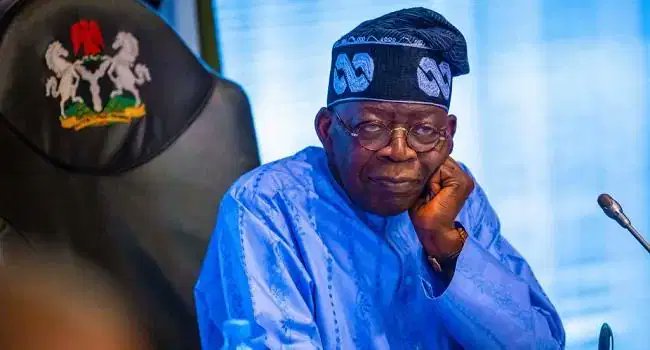
Northern Youth Council Faults Tinubu for Alleged Refusal to Hand Over Power to VP Shettima: A Deep Dive into Nigeria’s Political Tensions

The Northern Youth Council has recently called out President Bola Tinubu for what they describe as a failure to delegate authority to Vice President Kashim Shettima during his absence from the country.
This accusation, shared in a post on X by Shegzeblog (@shegzedon) on April 20, 2025, has sparked a fresh wave of debate about leadership accountability and adherence to democratic principles in Nigeria.
The image accompanying the post shows a person seated in front of Nigeria’s coat of arms, a symbol of national pride featuring two white horses representing dignity, a black shield symbolizing fertile soil, and a red eagle denoting strength.
Yet, the controversy surrounding Tinubu’s alleged actions casts a shadow over this emblem of unity.
According to the Northern Youth Council, Tinubu’s reluctance to hand over power during his absence goes against the 1999 Constitution, which outlines the proper transfer of authority to the vice president in such circumstances.
The group, led by its National President Isah Abubakar, pointed to historical examples of Nigerian leaders who followed this protocol.
Former Presidents Goodluck Jonathan and Umaru Musa Yar’Adua, for instance, ensured that their vice presidents assumed leadership roles during periods of absence or illness, setting a precedent for constitutional compliance.
The council argues that Tinubu’s failure to follow suit undermines the democratic norms that are essential for maintaining trust and stability in Nigeria’s governance system.
They have urged the president to respect these principles, emphasizing that all Nigerians deserve a leadership that values representation and accountability.
This issue also brings to light the deep-seated North-South divide that has long influenced Nigerian politics.
The tension between the predominantly Muslim North and the wealthier, largely Christian South has been a recurring challenge, often affecting policy decisions and governance.
Tinubu, a southerner, and Shettima, a northerner, were paired as a political duo to bridge this gap during their campaign, as evidenced by election posters in Lagos in February 2023.
However, recent events suggest that this partnership may not be enough to heal the historical fractures.
For instance, Tinubu’s economic reform agenda, including a proposed tax increase, was recently rejected by lawmakers, further exposing the regional rift that continues to shape the country’s political landscape.
The Northern Youth Council’s criticism of Tinubu can be seen as part of this broader struggle, where regional interests often clash with national priorities.
The image of the coat of arms in the X post serves as a poignant backdrop to this controversy. The emblem, with its green and white bands representing Nigeria’s rich soil and a white “Y” shape symbolizing the Niger and Benue rivers, is a reminder of the country’s diverse yet unified identity.
However, the current political discourse reveals the challenges of maintaining that unity. The Northern Youth Council’s call for inclusivity echoes earlier discussions about Tinubu’s leadership style.
Back in 2023, his Presidential Transition Committee was praised for its diverse composition, reflecting Nigeria’s plural society across regions, tribes, genders, and religions.
This move was seen as a step toward inclusive governance, a principle that Tinubu was expected to uphold throughout his tenure.
Yet, the council’s recent allegations suggest that inclusivity may still be a work in progress.
They argue that by not transferring power to Shettima, Tinubu is failing to ensure that every citizen feels represented and valued—a cornerstone of democratic governance.
As Nigeria navigates these challenges, the debate over leadership accountability and regional harmony remains a critical issue, one that could define the trajectory of Tinubu’s presidency and the nation’s democratic future.


